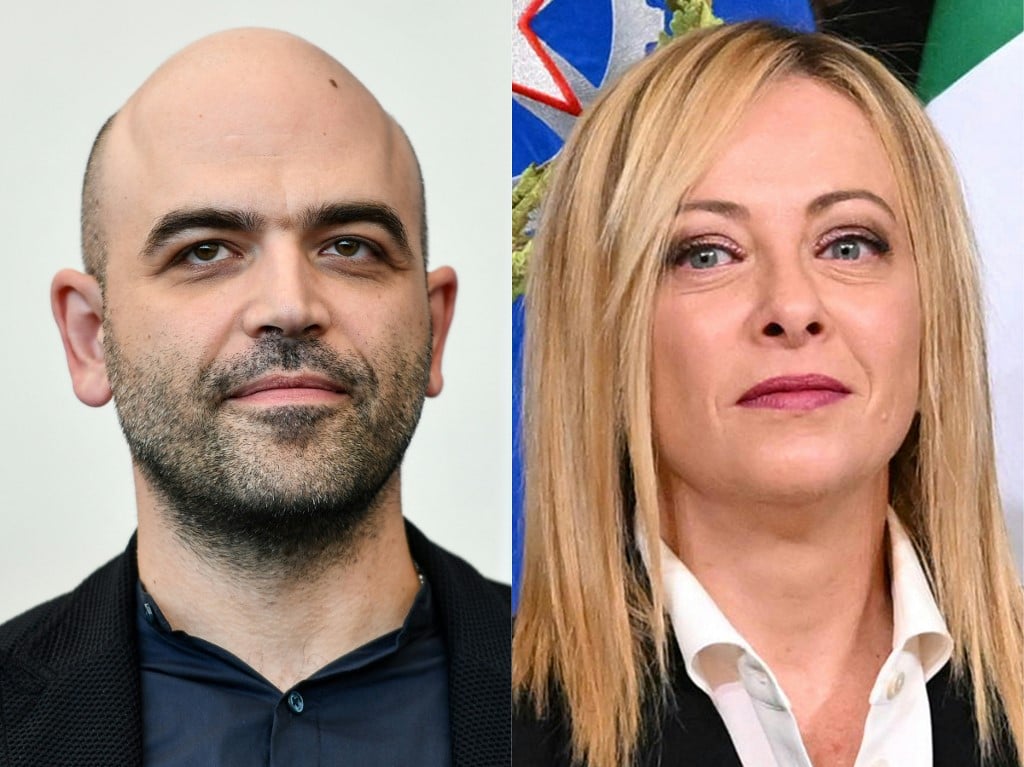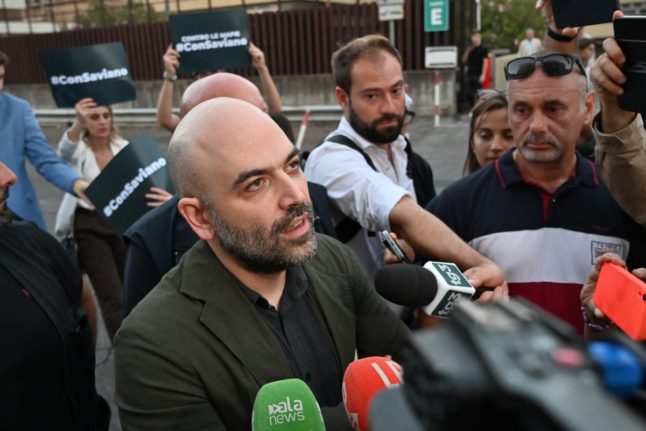Saviano, best known for his international mafia bestseller Gomorrah, had called the far-right leader a “bastard” on national television in December 2020, when Meloni was still in opposition.
His lawyer Antonio Nobile said he would appeal the verdict, after a trial that has sparked fears over freedom of speech in Italy.
But the fine was far less than the 10,000 euros requested by the Rome prosecutor, and the 75,000 euros in damages demanded by Meloni’s lawyer.
It was also suspended, meaning it need not be paid except in the case of a repeat offence, and will not be mentioned on Saviano’s criminal record, Nobile told AFP.
Speaking to reporters outside the Rome court, Saviano said Meloni’s hard-right government had sought to “intimidate” him for calling out “lies” about migrants and the charity ships that rescue them in the Mediterranean.
But he added: “There is no greater honour for a writer than to see their own words brought to trial… so today I am actually proud of having done this.”
READ ALSO: Six things to know about the state of press freedom in Italy
In court, Meloni’s lawyer, Luca Libra, had said Saviano’s words were not criticism but an “insult”, accusing him of using “excessive, vulgar and aggressive language”.
Press freedom groups had supported Saviano in a case he had described as a test of “whether or not it is possible to exercise the right of criticism” in
Italy.
Sabrina Tucci of PEN International said it was “deeply disappointed” at the verdict.
“This sentence is an attack on freedom of expression which the Italian constitution and international law recognise as an inalienable human right,” she said.
The fact the case was brought by the prime minister “is a dangerous warning for all writers and journalists… inviting them to measure their words, to not risk long legal battles, financial difficulties, emotional distress and imprisonment”, she added.

Saviano, who lives under police protection due to threats from the mafia, had made the comment about Meloni on a political TV chat show following the death in a shipwreck of a six-month-old baby from Guinea.
The baby, Joseph, had been one of 111 migrants rescued by the Open Arms charity ship. He died before he could receive medical attention.
In footage shot by rescuers and shown to Saviano on the show, the baby’s mother can be heard weeping “Where’s my baby? Help, I lose my baby!”
Saviano blasted Meloni, who leads the post-Fascist Brothers of Italy party, and Matteo Salvini, the leader of the anti-immigrant League party.
“I just want to say to Meloni, and Salvini: ‘You bastards! How could you?'” Saviano said on the show.
The year before, Meloni had said charity rescue ships “should be sunk”, while Salvini, as interior minister that same year, blocked such vessels from docking in Italian ports.
READ ALSO: What’s behind Italy’s soaring number of migrant arrivals?
After taking office in October 2022 on a promise to end migrant landings in Italy, Meloni’s government limited the activities of charity rescue ships – but the number of arrivals continues to soar.
Salvini – now deputy prime minister in Meloni’s government – has filed a separate defamation suit against Saviano for calling him the “minister of the criminal underworld” in a social media post in 201The case is still ongoing, with the next hearing due on December 7.
“I will not give up against this gang,” Saviano said Thursday.
Defamation through the media can be punished in Italy with prison sentences from six months to three years.
PEN International called on Italy to abolish its defamation laws, saying: “Those who express their opinions on matters of public interest should not feel threatened.”
Italy’s Constitutional Court urged lawmakers in 2020 and 2021 to rewrite the legislation, saying jail time for such cases was unconstitutional and should only be resorted to in cases of “exceptional severity”.
Italy has long compared poorly to its European neighbours for press freedom. It ranked 41st in the 2023 world press freedom index published by Reporters Without Borders, up from 58th in 2022.



 Please whitelist us to continue reading.
Please whitelist us to continue reading.
Member comments